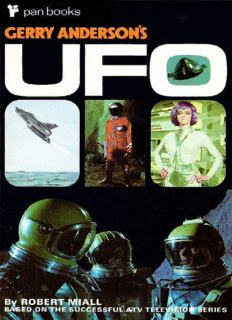
Gerry Anderson's UFO 01 PDF
Preview Gerry Anderson's UFO 01
1980—Unidentified Flying Objects race through the skies like bats out of hell, blasting . . . killing . . . vanishing to an unknown alien world. With lunar missiles, orbiting satellites and manned supersonic warheads, Supreme Headquarters, Alien Defence Organization, makes ready to seek, find and destroy the intruders. Only SHADO stands between an unsuspecting world and the terror unleashed by a dying planet . . . In the same series by Robert Miall UFO 2 First published 1970 by Pan Books Ltd., 33 Tothill Street, London, S.W.1 ISBN 0 330 02644 5 © Century 21 Merchandising Ltd., 1970 © Robert Miall, 1970 Printed in Great Britain by Cox & Wyman Ltd., London, Reading and Fakenham CONDITIONS OF SALE This book shall not, by way of trade or otherwise, be lent, re-sold, hired out or otherwise circulated without the publisher's prior consent in any form of binding or cover other than that in which it is published and without a similar condition including this condition being imposed on the subsequent purchaser. The book is published at a net price, and is supplied subject to the Publishers Association Standard Conditions of Sale registered under the Restrictive Trade Practices Act, 1956. 1 IT WAS in all the newspapers. But it was not all in the newspapers, not exactly the way it happened. Those men had come together for a purpose, and it was better that the world should not know too much about it. Nationwide panic, worldwide hysteria weren’t going to help. There were D notices and official censors, and censors whom nobody knew existed. And all because of those other things which ought not to have existed—the biggest headache in the history of mankind, a headache that was going to cost more and more to treat, let alone cure. The US Air Force plane made its landing in England that day without fuss. Supply planes came in daily, training sorties went up so often that the villagers were inured to their streets sounding like echo chambers for jets of all sizes and shapes and decibel outputs. There was a Rolls-Royce waiting, with two police motorcycles in attendance. It had attracted a few glances as it swung in towards the gates of the airbase, but no more than that: top brass often went through here in style, offered every comfort at the taxpayers’ expense. General Henderson acknowledged salutes as he left the plane, gave a peremptory jerk of his head to cut short the formalities, and moved briskly towards the Rolls. A young officer opened the door. Another young man was behind Henderson as he slid into the interior. The chauffeur stared straight ahead, flanked by an attentive but impassive Special Branch man. In the back seat a man in his middle forties, with grey hair and grey eyes and a stern mouth, held out a hand to the General. Henderson said: ‘Minister, this is Colonel Straker.’ The younger man shook hands and settled himself on the pull-down seat facing them, resting his left arm across his knees to adjust the weight of a document case chained to his wrist. ‘The Prime Minister is already at Chequers. We’ll be there in thirty minutes,’ said the Minister. The cycles throbbed into life. The gates opened, the little group turned out on to the road, and a flicker of sunlight and tree shadows increased its tempo across the Englishman’s grave features. He went on: ‘We’ve been in constant communication with Paris, Moscow and Bonn during your visits. I can assure you that my Government’s approval will be a formality.’ ‘The evidence is absolutely conclusive.’ The General nodded to his aide. Colonel Straker opened the document case and passed a clip of typed notes across, together with two photographs. The Minister winced at the mangled body shown on the first picture; caught his breath at the incredible object framed in the centre of the other. ‘It couldn’t possibly be a fake?’ ‘The film was found undeveloped,’ said Henderson, ‘still in the camera. It’s genuine. Take my word for it.’ The sunlight faded. Clouds darkened the road and the fields and the interior of the car. The Minister shivered. ‘It’s . . . too much like some grotesque hoax. Men from Mars . . . flying saucers . . . a music-hall joke." ‘No joke. I wish it were.’ There was a sudden blaze of lightning. Only it wasn’t lightning. There was an explosion, a hundred yards back by the roadside, that buffeted the Rolls. Straker’s hand was out. ‘I’ll take the file, sir.’ As the Minister handed the sheets back to him, there was another flash, another brutal shock wave against the car. ‘Get down!’ Abruptly there was intolerable light all round them, a crackle of breaking glass, and the howl of tires—and somewhere a man screaming in agony, and then dizziness and a stomach-lurching moment as there was no weight, no certainty, only the sensation of falling. The Rolls came to rest against a tree, jarring to rest and exploding in a gout of flame. Straker was hurled from a door as it sprang open. He got to his feet, fell, crawled away. Then he forced himself to turn back towards the searing flames. Henderson was groping to escape. Straker shielded his eyes with his arm, stumbled up the ragged slope. ‘The Minister . . .?’ A charred, curling shred of photographic print fluttered across the grass. It showed a corner of that impossible device. Impossible? But what else could have blazed from the clouds; what else would have struck them down as it had struck
